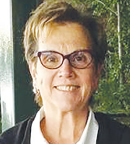
It’s so overwhelming to learn you have cancer. Your mind can’t process all the information and what it actually means to have cancer, not just immediately, but for the rest of your life.— Pati Schembari
Tweet this quote
The news that I had breast cancer came at an especially difficult time in my life and was quite shocking to hear. My father had died of lung cancer just 1 month before my diagnosis, and I was still grieving his death when I suddenly had to confront my own mortality. In retrospect, the diagnosis shouldn’t have come as such a shock. Suspicious-looking calcifications and cysts in my left breast had been showing up on screening mammograms for years, but because they were always determined to be “normal,” I put the thought of cancer out of my mind.
I wasn’t even unduly alarmed when I noticed that the tissue in my left breast had become firmer, although I did make a mental note to raise the issue with my primary care physician during my annual physical exam. I learned soon afterward that I did, in fact, have breast cancer and that it was aggressive. It may have been growing, undetected, for about 2 years.
Coming to Terms With a Cancer Diagnosis
A biopsy of my breast tissue showed I had between stage 2 and 3 hormone receptor–positive invasive ductal carcinoma. The surgeon called me at home, when I was alone, to deliver the diagnosis. I found it so difficult to breathe as I was listening to his description of what was to happen next. It felt as though someone was cutting off the air supply to my lungs. While I was waiting for the test results, the thought occurred to me that I could have cancer, but I never really expected it to happen to me. I guess that’s a mistake many of us make, but cancer knows no boundaries.
I was prescribed a chemotherapy regimen of doxorubicin and cyclophosphamide, followed by several treatments of docetaxel followed by radiation therapy. And although the treatments did their job of shrinking my tumor, they were so toxic. Not only did I lose my hair and the nails on all of my fingers and toes, the drugs also damaged my tear ducts—causing my eyes to water uncontrollably and impairing my vision—and my lungs, which put me in the hospital with pneumonia so severe I nearly died.
Remnants of Cancer
Although I did not test positive for a BRCA mutation, I made the decision to have a contralateral prophylactic mastectomy and an oophorectomy, because I wanted to do everything I could to reduce my risk of a cancer recurrence. So far, 10 years after my diagnosis, I remain cancer-free. However, the aftermath of having cancer is still with me. The damage to my tear ducts has resulted in several painful operations on my eyes to insert prosthetic tear ducts into the nasolacrimal duct to drain the fluid in my eyes. The tubes only provide brief relief and have to be cleaned every 6 to 8 months, necessitating additional surgery. I also have lingering neuropathy in my hands and feet, as well as ongoing achiness from anastrozole. As a result, I feel decades older than my 61 years.
Looking Forward to the Future
When I was diagnosed, my oncologist explained that I had an aggressive cancer and that he would treat it aggressively, but I’m not sure I understood everything he was saying. It’s so overwhelming to learn you have cancer. Your mind can’t process all the information and what it actually means to have cancer, not just immediately, but for the rest of your life.
I wonder if closer monitoring for chemotherapy side effects could have prevented some of the long-term problems I still contend with, but I try to stay positive. I know how lucky I am to be alive, and I’m grateful that I’ve had 10 more years to be with my family and experience the joys of everyday life. Now, I’m looking forward to the next 10. ■
Ms. Schembari lives in Montrose, New York.

